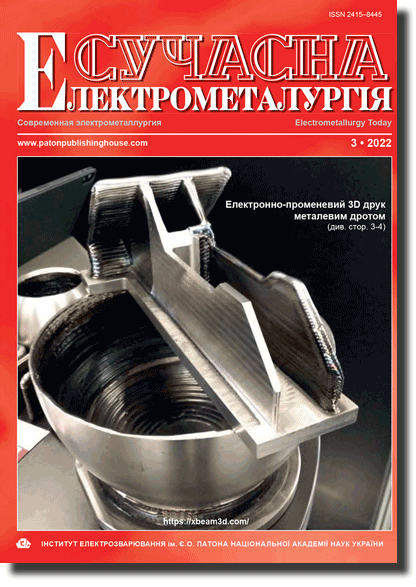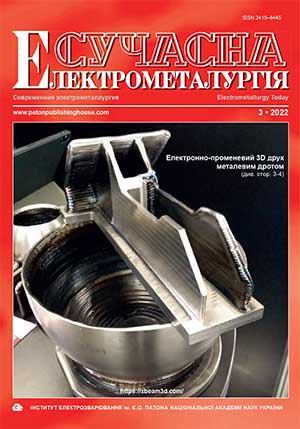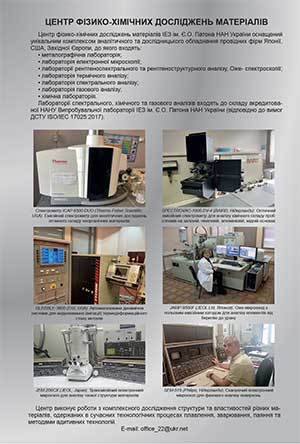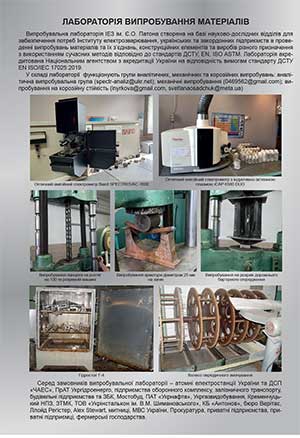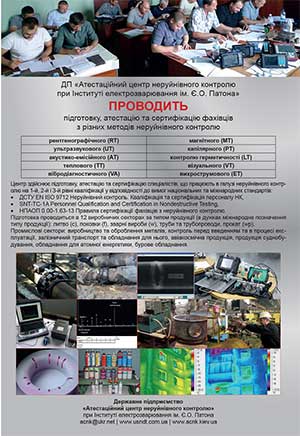| 2022 №03 (01) |
DOI of Article 10.37434/sem2022.03.02 |
2022 №03 (03) |
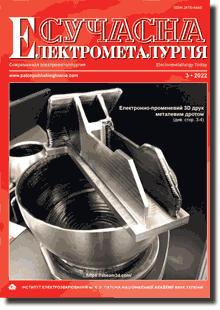
"Suchasna Elektrometallurgiya" (Electrometallurgy Today), 2022, #3, 11-17 pages
Development of the CoCrAlY/ZrO2–8 % Y2O3 type thermal barrier coating by surface doping of the metal layer with aluminum
K.Yu. Yakovchuk1, G.P. Myalnitsya2, A.V. Mykytchyk1, Yu.E. Rudoy1, R.O. Tkach1
1State-Run Enterprise «International Center for Electron Beam Technologies of the E.O. Paton Electric Welding Institute, NASU», 68 Antonovych Str. 03150, Kyiv, Ukraine. E-mail: yakovchuk@paton-icebt.kiev.ua
2State-Run Enterprise «Gas Turbine Research & Production Complex «Zorya»-«Mashproekt». 42-a Bohoyavlenskyi Prosp., 54018, Mykolayiv, Ukraine. E-mail: presz@zorya.com.ua
Abstract
The diffusion processes occurring at aluminum enrichment of the CoCrAlY overlayer during vacuum annealing from the slurry suspension applied to its surface and their influence on the structure, chemical composition and properties of CoCrAlY/ZrO2–8 % Y2O3 electron beam evaporated on nickel-based superalloy samples were studied. It is shown that the diffusion layer formed on the surface of the CoCrAlY alloy, enriched in aluminum, has a heterogeneous thickness and contains two microstructural zones with different aluminum content (external zone with aluminum up to 31 % and inner with aluminum up to 19 %). It was found that during vacuum heat treatment, cobalt and chromium diffuse into the slurry layer. As a result, microhardness increases up to 9 GPa and microcracks that propagate into the CoCrAlY layer are formed. The parameters of low-temperature heat treatment, which provides the formation of a defect-free diffusion zone in CoCrAlY, are established. The attained results allowed us to optimize the technology of CoCrAlY layer thermodiffusional alumization from the slurry for CoCrAlY/ZrO2–8 % Y2O3 coatings in order to increase the operating temperature of the turbine blades made of CM-88U and CM-93 superalloys. Ref. 9, Tabl. 6, Fig. 7.
Keywords: electron beam physical vapor deposition; thermal barrier coatings; nickel-based superalloy; CoCrAlY metal bond coat; thermodiffusional alumization; slurry; thermally grown Al2O3 oxide (TGO); ZrO2–8 % Y2O3 outer ceramic layer, diffusion of elements
Received 30.06.2022
References
1. Darolia, R. (2013) Thermal barrier coatings technology: Critical review, progress update, remaining challenges and prospects. Int. Mater. Rev., 58, 315-348. https://doi.org/10.1179/1743280413Y.00000000192. Pollock, Т.М., Lipkin, D.V., Hemker, K.J. (2012) Multifunctional coating interlayers for thermal-barrier systems. MRS Bulletin, 37, 923-931. https://doi.org/10.1557/mrs.2012.238
3. Movchan, B.A., Yakovchuk, K.Yu. (2004) Graded thermal barrier coatings, deposited by EB-PVD. Surface & Coatings Technology, 188-189, 85-92. https://doi.org/10.1016/j.surfcoat.2004.08.006
4. Bababdani, S., Nogorani, F. (2014) Overaluminizing of a Co-CrAlY coating by inward and outward diffusion treatments. Metallurg. and Mater. Transact., A45, 2116-2112. https://doi.org/10.1007/s11661-013-2138-4
5. Jiang, J., Zhao, H., Zhou, X. et al. (2013) Oxidation resistance of vacuum plasma sprayed CoNiCrAlY coating modified by filtered cathodic vacuum arc deposition aluminizing. J. of Thermal Spray Technology, 22, 69-74. https://doi.org/10.1007/s11666-012-9866-7
6. Pillai, R., Jalowicka, A., Galiullin, T. et al. (2019) Simulating the effect of aluminizing on a CoNiCrAlY-coated Nibase superalloy. Calphad, 65, 340-345. https://doi.org/10.1016/j.calphad.2019.04.004
7. Boissonnet, G., Grégoire, B., Bonnet, G., Pedraza, F. (2019) Development of thermal barrier coating systems from Al microparticles. Pt I: Influence of processing conditions on the mechanisms of formation. Surface and Coatings Technology, 380, 125085. https://doi.org/10.1016/j.surfcoat.2019.125085
8. Kashin, D.S., Dergacheva, P.E., Stekhov, P.A. (2018) Heat-resistant coatings deposited by slip method (Review). Trudy VIAM, 65(5), 64-75 [in Russian]. https://doi.org/10.18577/2307-6046-2018-0-5-64-75
9. Jalowicka, A, Naumenko, D., Ernsberger, M. et al. (2018) Alumina formation and microstructural changes of aluminized CoNiCrAlY coating during high temperature exposure in the temperature range 925-1075 ºC. Materials at High Temperatures, 35(1-3), 66-77. https://doi.org/10.1080/09603409.2017.1392114
Advertising in this issue:
The cost of subscription/purchase order journals or individual articles
| Journal/Currency | Annual Set | 1 issue printed |
1 issue |
one article |
| TPWJ/USD | 384 $ | 32 $ | 26 $ | 13 $ |
| TPWJ/EUR | 348 € | 29 € | 24 € | 12 € |
| TPWJ/UAH | 7200 UAH | 600 UAH | 600 UAH | 280 UAH |
| AS/UAH | 1800 UAH | 300 UAH | 300 UAH | 150 UAH |
| AS/USD | 192 $ | 32 $ | 26 $ | 13 $ |
| AS/EUR | 180 € | 30 € | 25 € | 12 € |
| SEM/UAH | 1200 UAH | 300 UAH | 300 UAH | 150 UAH |
| SEM/USD | 128 $ | 32 $ | 26 $ | 13 $ |
| SEM/EUR | 120 € | 30 € | 25 € | 12 € |
| TDNK/UAH | 1200 UAH | 300 UAH | 300 UAH | 150 UAH |
| TDNK/USD | 128 $ | 32 $ | 26 $ | 13 $ |
| TDNK/EUR | 120 € | 30 € | 25 € | 15 € |
AS = «Automatic Welding» - 6 issues per year;
TPWJ = «PATON WELDING JOURNAL» - 12 issues per year;
SEM = «Electrometallurgy Today» - 4 issues per year;
TDNK = «Technical Diagnostics and Non-Destructive Testing» - 4 issues per year.




